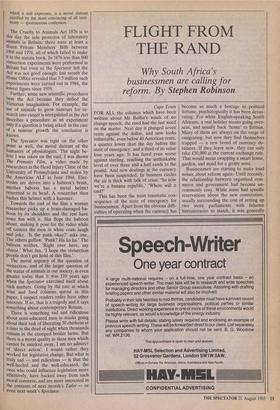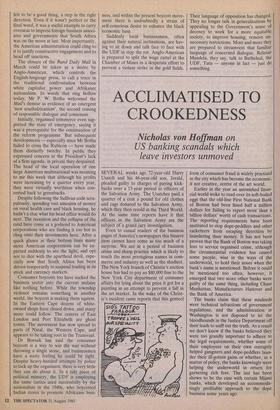FLIGHT FROM THE RAND
Why South Africa's
Cape Town FOR ALL the volumes which have been written about Mr Botha's winds of no change speech, the rand had the last word on the matter. Next day it plunged seven cents against the dollar, and now looks vulnerable, even below 40 American cents, a quarter lower than the day before the state of emergency, and a third of its value four years ago. It has fared even worse against sterling, reaching the unthinkable level of over three and a half rands to the pound. And now dealings in the currency have been suspended. In business circles the air is thick with talk of crisis: 'So now we're a banana republic,' Where will it end?'
This has been the most traumatic con sequence of the state of emergency for businessmen. Apart from the obvious diffi- culties of operating when the currency has become so much a hostage to political fortune, psychologically it has been devas- tating. For white English-speaking South Africans, a real holiday means going over- seas, and usually back 'home' to Britain. Many of them are always on the verge of emigrating, but now they find themselves trapped — a new breed of currency de- tainees. If they leave now, they can only take £30,000 at the current exchange rate. That would mean swapping a smart home, garden, and maid for a grotty semi.
Businessmen are starting to make loud noises about reform again. Until recently, the relationship between organised com- merce and government had become un- commonly cosy. While some had specific reservations about the new constitution, usually surrounding the cost of setting up two more parliaments with fulsome bureaucracies to match, it was generally felt to be a good thing, a step in the right direction. Even if it wasn't perfect or the final word, it was a useful example to carry overseas to impress foreign business associ- ates and governments that South Africa was on the move at last. Most importantly, the American administration could cling to it to justify constructive engagement and to head off sanctions.
The closure of the Rand Daily Mail in March could be taken as a desire by Anglo-American, which controls the English-language press, to call a truce in the traditional confrontation between white capitalist power and Afrikaner nationalism. In words that ring hollow today, Mr P. W. Botha welcomed the Mail's demise as evidence of an emergent `new southafricanism', the second coming of responsible dialogue and consensus.
Initially, organised commerce even sup- ported the state of emergency, saying it was a prerequisite for the continuation of the reform programme. But subsequent developments — especially since Mr Botha failed to cross the Rubicon — have made them distinctly twitchy. In public they expressed concern at the President's lack of a firm agenda, in private they despaired. The head of the local operation of one large American multinational was moaning to me this week that although his profits were increasing by a quarter every year, they were virtually worthless when con- verted back to greenbacks.
Despite following the Sullivan code scru- pulously, spending vast amounts of money on rural health care and black housing, he hadn't a clue what his head office would do next. The recession and the collapse of the rand have come as a godsend to American corporations who are finding it too hot to cling onto their investments here. After a quick glance at their bottom lines many. more American corporations can be ex- pected suddenly to see the light, and opt not to dice with the apartheid devil, espe- cially now that South Africa has been driven temporarily to suspend trading in its stock and currency markets.
Consumer boycotts too have sucked the business sector into the current malaise like nothing before. While the township violence remains something in another world, the boycott is making them squirm. In the Eastern Cape dozens of white- owned shops have closed down, and many more could follow. The centres of East London and Port Elizabeth are ghost towns. The movement has now spread to parts of Natal, the Western Cape, and appears to be taking root in the Transvaal.
Dr Boesak has said the consumer boycott is a way to win the war without throwing a single stone, and businessmen have a nasty feeling he could be right. Despite heavy-handed attempts by police to lock up the organisers, there is very little they can do about it. In a tidy piece of political mimicry, the UDF is employing the same tactics used successfully by the nationalists in the 1940s, who boycotted Indian stores to promote Afrikaans busi- ness, and within the present boycott move- ment there is undoubtedly a strain of self-conscious desire to enhance the black economic base.
Suddenly local businessmen, often against their natural inclinations, are hav- ing to sit down and talk face to face with the UDF to stop the rot. Anglo-American is prepared to split the wage cartel at the Chamber of Mines in a desperate effort to prevent a violent strike in the gold fields. Their language of opposition has changed. They no longer talk in generalisations by appealing to the Government's sense of decency to work for a more equitable society, to improve housing, remove un- necessary restrictions. More and more they are prepared to circumvent that familiar language of concerned dialogue. Release Mandela, they say, talk to Buthelezi, the UDF, Tutu — anyone in fact — just do something.











































 Previous page
Previous page